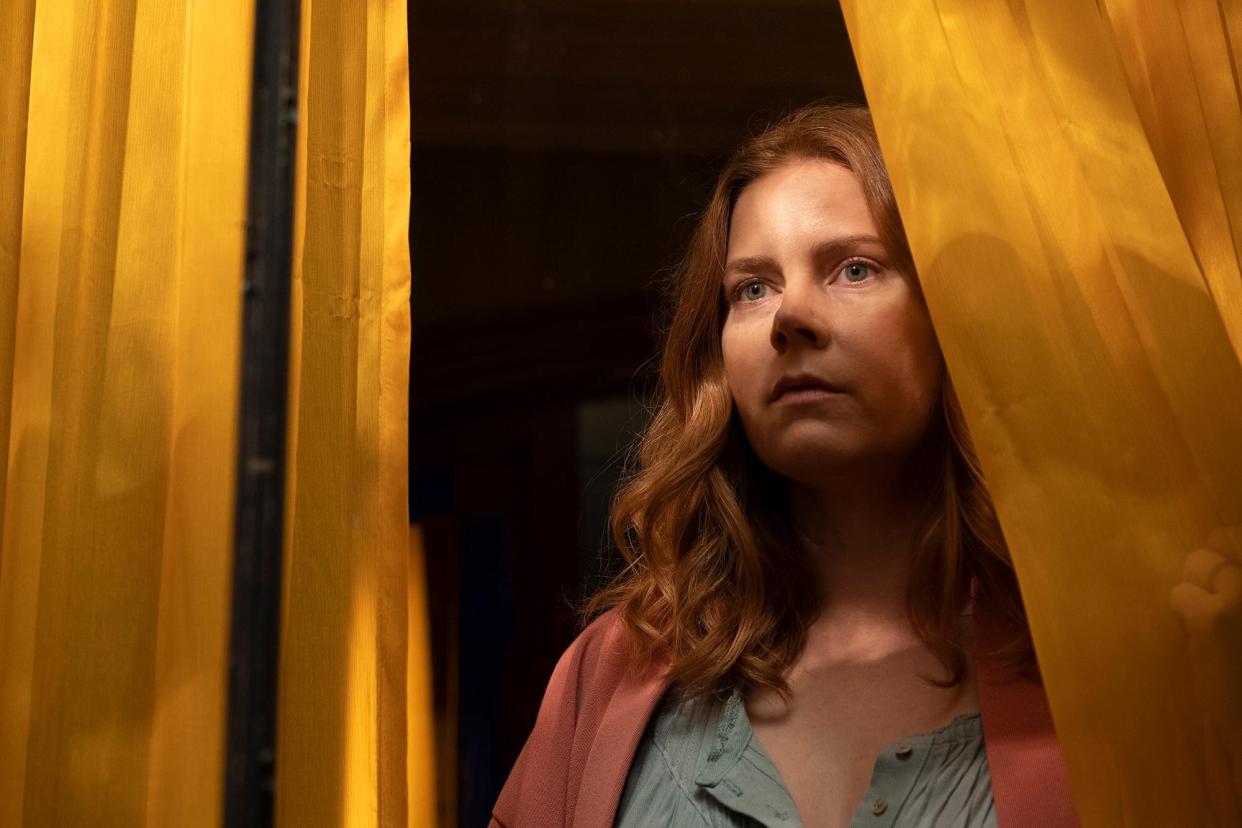The Woman in the Window review: Amy Adams is trapped in this Netflix house thriller, and so are you

- Oops!Something went wrong.Please try again later.
- Oops!Something went wrong.Please try again later.
Melinda Sue Gordon/NETFLIX Amy Adams in 'The Woman in the Window'
In the opening moments of The Woman in the Window, the camera pans across a television screen paused on an iconic scene from Rear Window, Jimmy Stewart's face frozen in a glitching, panicked grimace. It's a neat little nod to the plain debt the movie owes its predecessors, and probably the most Hitchcockian thing in director Joe Wright's strange, mercurial thriller.
The film's convoluted path from best-selling novel to Netflix (streaming May 14) has already become a narrative in its own right: the sensational New Yorker exposé of author Dan Mallory's misdeeds, early studio changes and extensive reshoots followed by the requisite pandemic delays. And the end result — a gorgeously shot pile of half-cooked ideas and atmosphere — does have the feel of something tweaked and market-tested into oblivion, its story line never quite trusting that the viewer will follow along unless every clue is buried in a shallow grave, with at least one red flag planted to mark the spot.
The titular Woman is Amy Adams' Anna Fox, once a therapist and now an agoraphobic shut-in trapped within the walls of a Manhattan townhouse so palatial it nearly counts as free range. Wine-lipped and lank-haired, she wanders between rooms in a series of sad house sacks, her only outlets the library of classic movies she watches on repeat and a seemingly bottomless goblet of merlot. At least she still has sessions every week with her own psychiatrist (Tracy Letts, who also wrote the screenplay), and phone calls to her estranged husband (The Falcon and the Winter Soldier's Anthony Mackie) — "we're separated," is all she'll say, tartly — and young daughter.
Otherwise, the sole human Anna sees with any regularity is her downstairs tenant (Wyatt Russell), a shaggy singer-songwriter who comes and goes and has little time for her neuroses. But idle hours have piqued her interest in the new family moving in across the way, so when their teenage son Ethan (Fred Hechinger) drops by with a neighborly gift and hints that all is not well at home, something stirs in her. Even from a distance, the boy's father (Gary Oldman) seems like an overbearing bully; his mother, though (Julianne Moore), when she finally introduces herself, comes off as jittery and funny, maybe even someone to confide in.
Until Anna peers through her window one night and sees what very clearly looks like the murder of her new friend — and is told when she reports it that there is no weapon, no evidence, no friend. Wright, the director of prestige historical dramas like Darkest Hour and Pride and Prejudice, here leans into the kind of fevered theatricality that marked one of his more experimental efforts, 2012's Anna Karenina; certain images composed and framed like surreal, immaculate still lifes.
Adams, though, is stuck with a protagonist so shrill and chaotic and self-absorbed — the classic unreliable narrator, doubled and dunked in Cabernet — that there's not much left to sympathize with. (Karenina at least took us out of the house.) Reliable actors like Oldman and Brian Tyree Henry (as a remarkably tolerant detective) do better by their undersketched characters than they deserve, and the final 30 minutes of the film descend into something so bloody and outrageous it nearly works as camp. Still, it's hard not to think of the better movie buried somewhere in Window's odd feints and histrionics, if only its makers had trusted themselves — or been trusted — to tell it. Grade: B-
Related content:

